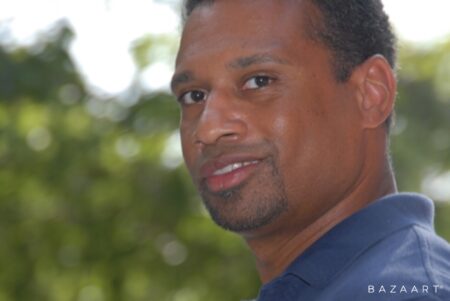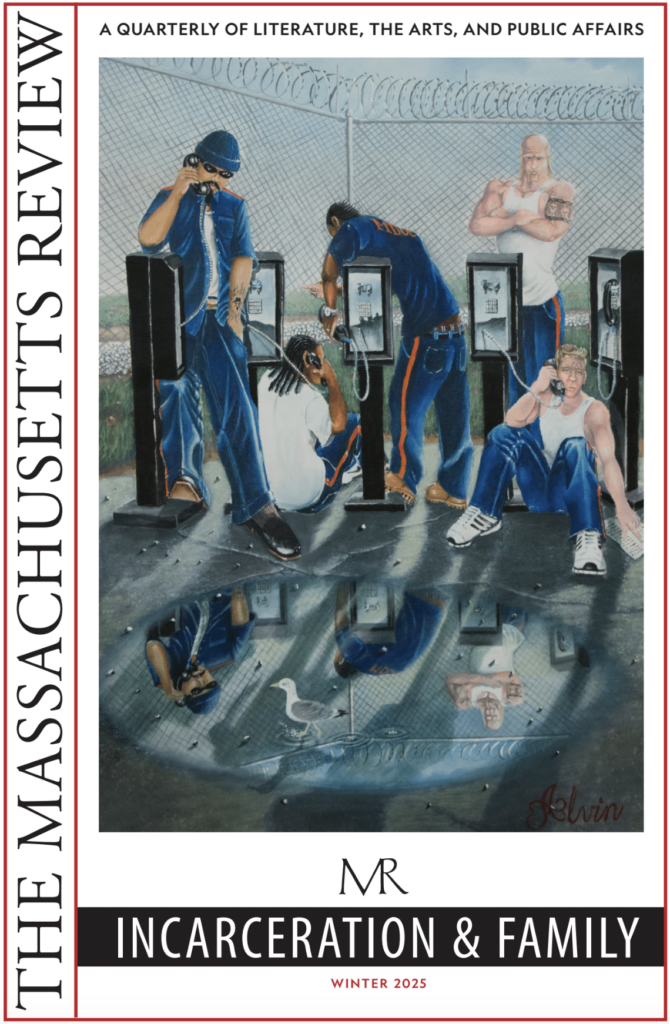10 Questions for Allen Price

“That stigma isolated me from the many other gay men who share my experience. What a loss for all of us to be separated by our silence. Over the past four years, my new friend from the dating app helped me to speak in public about my rape, and I realized there was no healing without sharing. At the root of how living beings connect is vulnerability, and I can’t have intimate connection without being vulnerable.”
–from “Rape Closet,” Volume 66, Issue 2 (Summer 2025)
Tell us about one of the first pieces you wrote.
The first short story I wrote was about my dog, Lady when I was in high school entitled “My Lifelong Companion.” She was a Springer Spaniel and my best friend. We had a strong connection. I just knew I would miss her terribly when she passed. I wanted to memorialize her and our relationship. It’s not a publishable piece, but to me, the story brings tears and such warmth and comfort. She left earth thirty years ago this year, September 1995, and lived to be fourteen. I am so glad I wrote the story.
What writer(s) or works have influenced the way you write now?
James Baldwin, Toni Morrison, Richard Wright, Phillis Wheatley, Robert Jones Jr., Ralph Ellison, Edgar Allan Poe, Andre Dubus, Andre Dubus III, Audre Lourde, Frantz Fanon, Annie Proulx, Roxane Gay, Deesha Philyaw, Kiese Laymon, Langston Hughes, Lorraine Hansberry, Stephen King, Margaret Atwood, Cormac McCarthy, John Updike, Noam Chomsky, Zora N. Hurston, Sylvia Plath, Upton Sinclair, George Orwell, Octavia Butler, Joan Didion, Eddie Glaude, Carol Anderson, Eric Foner, Henry David Thoreau, Tobias Wolff, Salman Rushdie, Isabel Wilkerson, Victor Frankl, W.E.B. DuBois, Paul Lynch, Alexander Chee, Walt Whitman, Mary Trump, David Corn, Kurt Anderson, Tommy Orange, Paul Laurence Dunbar. Of all these writers, Frantz Fanon’s Black Skin, White Masks, James Baldwin’s Notes of a Native Son, and Edgar Allan Poe’s The Fall of the House of Usher are the works that have had the most influence on my writing.
What other professions have you worked in?
When I was in high school I was a cook at Burger King, a games attendant and ride attendant at Rocky Point Park, and a sales associate at Chess King and Structure/ Express men’s clothing store. In college I was a sales associate at GNC, a cashier at Staples, and interned at Merrill Lynch. After college, I landed my dream job: a pricing analyst at what was then the world’s largest mutual fund company, Skudder Kemper Investments in Boston. I decided to go grad school for journalism. When I graduated I wrote for Muscle & Fitness and the now defunct Natural Health magazine.
What did you want to be when you were young?
I wanted to be a supermodel like Tyson Beckford. I attended John Casablancas Modeling School and did some modeling for men’s clothing lines. I was already in college majoring in accounting when I realized I would have to move to NYC, and how little a chance I had of making it big, so I decided to get a job in finance when I graduated.
What inspired you to write this piece?
It’s not so much what, but rather who. A man I met on a gay dating app during Covid, who I mention in the essay, got me to see the sexual assault I suffered in a way I hadn’t before. I came out in 1987 when I was 16. For decades, I went to gay clubs and circuit parties around the country. I attended both the 1993 and 2000 gay March on Washington. Wherever I went I had gay men grabbing my butt, my crotch, put their hands down my pants, rubbing their hands on my chest, I even had someone bounce a quarter off my ass when I was at a bar in Chicago during Market Days. I would smile and tolerate that mistreatment as if it was something I had to accept. The man I met on that app made me realize that that too is sexual assault. So many gay men think sexual harassment and sexual assault are just something that’s part of gay life. I wanted to let gay men know that that behavior should never be tolerated, and those who engage in that behavior realize the pain and the emotional damage they’re causing.
Is there a city or place, real or imagined, that influences your writing?
I am drawn to the night: the moon, the stars, the silhouette of the trees against the night sky. The sound of an owl hooting is soothing, like an angel singing. During the pandemic I discovered many nature preserves in my state that I never knew about. I go to those places to write.
Do you have any rituals or traditions that you do in order to write?
I write in the early morning hours of the day. That’s when my mind is at its freest. When the sun goes down the ideas flow, inspiration comes and I go to a nature place and start to write for about 6 hours.
If you could work in another art form what would it be?
Dance. I love music. I love to dance. I have been a dancer since elementary school. I used to do all of the choreography to Madonna’s and Janet Jackson’s music videos. I danced in the follies of my high school on my junior and senior years. I never stopped dancing. All throughout the 1990s and 2000s, I went dancing every weekend in NYC, Boston, and DC at those famous nightclubs that are now closed: The Limelight, The Roxy, Tunnel, Splash, Twilo, Avalon/Axis, Venus De Milo, Buzz, Campus/Manray, Tracks, The Frat House, The Edge, Badlands, and The Fireplace.
What are you working on currently?
I’m finishing a memoir currently titled, What Racism Has Wrought. It’s about my mother being diagnosed with paranoid schizophrenia in 2023 as a result of the trauma she suffered from racism. It takes place over the month she spent in a mental institution where the hospital, doctors, and myself worked to figure out how a sixty-eight-year-old woman suddenly, out of nowhere, at such an advanced age, for two years, had hallucinations and delusions of white people trying to kill her. In June 2024, Roxane Gay published an essay I wrote about it titled “Black Negation” in her newsletter, The Audacity. Roxane’s agent read it and Roxane introduced us. She proposed the idea of my writing a book about it.
What are you reading right now?
I just finished In the Dream House by Carmen Maria Machado. I’m halfway through Susannah Cahalan’s Brain on Fire, and I just started Cormac McCarthy’s Stella Maris. I read weekly Timothy Synder’s On Tyranny given where are country is at this present moment in time.
ALLEN M. PRICE was a finalist for the 2025 Michigan Quarterly Review James A. Winn Nonfiction Prize. He won Solstice’s 2023 Michael Steinberg Nonfiction Prize (chosen by Grace Talusan), Blue Earth Review‘s 2022 Flash Creative Nonfiction Contest, and Columbia Journal’s 2021 Winter Nonfiction Contest (chosen by Pamela Sneed). A four-time Pushcart Prize nominee, his work appears or is forthcoming in Roxanne Gay’s The Audacity, The Missouri Review, Massachusetts Review, About Place Journal, Five Points, Bellingham Review, Evergreen Review, The Fourth River, Little Patuxent Review, Blue Mesa Review, Zone 3, Post Road, North American Review, The Masters Review, Terrain.org, Shenandoah, Transition, among others. He has an MA from Emerson College.



